A lawsuit that alleges a 2020 census question pushed by the Trump administration violates minorities' rights will be sent back to a federal court in Maryland so new evidence can be considered, U.S. appeals judges ruled Tuesday.
The 4th Circuit Court of Appeals' decision comes a day after U.S. District Judge George Hazel of Maryland suggested in an opinion that racial discrimination and partisan power plays could be the underlying motives in asking everyone in the country about citizenship status. The 4th Circuit's order sending the case back to Hazel could be pivotal.
"The decision today opens up a potentially new legal front in the fight against the citizenship question," said Thomas Wolf, counsel for the Democracy Program at the Brennan Center for Justice and an expert on census matters.
The Supreme Court is expected to decide this week whether the Trump administration can add its citizenship question to the 2020 population survey. However, the justices are not considering legal questions about whether the citizenship addition might be discriminatory.
Now that the 4th Circuit has sent this lawsuit back to the federal court in Maryland, Hazel could issue an injunction blocking the citizenship question. If that were to happen, the order issued by the lower court would have to hold until the Supreme Court can take up the matter, according to Wolf.
And because the Supreme Court does not generally hear arguments again until October after this week's decisions, there would be more time for the 4th Circuit to hear an appeal, said Jennifer Nou, a University of Chicago law professor.
"Who will be the 'final word' depends on the true deadline for when the census forms must be printed. If the true deadline for the census forms occurs before the Supreme Court reconvenes, for example, there is a chance that the 4th Circuit could be the final word," Nou said in an email.
The Trump administration insists that printing of census questionnaires is supposed to begin July 1. It wants justices to resolve the citizenship question swiftly in its favor, essentially cutting off additional proceedings in court in Maryland and New York and allowing the census forms to be printed with the new question.
Even before the 4th Circuit issued its order, the U.S. Justice Department was urging the Supreme Court to ignore the evidence Hazel says merits further review.
"It is based on a speculative conspiracy theory that is unsupported by the evidence and legally irrelevant to demonstrating that (Commerce Secretary Wilbur Ross) acted with a discriminatory intent," Solicitor General Noel Francisco, Trump's top Supreme Court lawyer, wrote in a Tuesday letter to the court.
But in his court filing Monday, Hazel reasoned that the trove of new evidence "potentially connects the dots between a discriminatory purpose — diluting Hispanics' political power — and Secretary Ross's decision" to include the citizenship question.
The new evidence consists of computer documents from Republican operative Tom Hofeller, who died last year. They include detailed calculations projecting gains Republicans would see in Texas by basing legislative districts on the number of voting-age citizens rather than the total population. The late North Carolina redistricting expert said in the documents that GOP gains would be possible only if the census asked every household about its members' immigration status for the first time since 1950.
Ross, who oversees the Census Bureau, said in a memo last year that the Justice Department wants to ask the question to gather data to help identify majority-minority congressional districts, which the Voting Rights Act calls for when possible.
In his opinion issued a day before the 4th Circuit's order, Hazel said he would reopen discovery for 45 days, order an evidentiary hearing and issue a "speedy ruling."
Associated Press writer Mark Sherman in Washington contributed to this report.
Follow McFadden on Twitter: https://twitter.com/dmcfadd
UNITED NATIONS (AP) — The United States vetoed a widely backed U.N. resolution Thursday that would have paved the way for full United Nations membership for Palestine, a goal the Palestinians have long sought and Israel has worked to prevent.
The vote in the 15-member Security Council was 12 in favor, the United States opposed and two abstentions, from the United Kingdom and Switzerland. U.S. allies France, Japan and South Korea supported the resolution.
The strong support the Palestinians received reflects not only the growing number of countries recognizing their statehood but almost certainly the global support for Palestinians facing a humanitarian crisis caused by the war in Gaza, now in its seventh month.
The resolution would have recommended that the 193-member U.N. General Assembly, where there are no vetoes, approve Palestine becoming the 194th member of the United Nations. Some 140 countries have already recognized Palestine, so its admission would have been approved, likely by a much higher number of countries.
U.S. deputy ambassador Robert Wood told the Security Council that the veto “does not reflect opposition to Palestinian statehood but instead is an acknowledgment that it will only come from direct negotiations between the parties."
The United States has “been very clear consistently that premature actions in New York — even with the best intentions — will not achieve statehood for the Palestinian people,” deputy State Department spokesman Vedant Patel said.
His voice breaking at times, Palestinian U.N. Ambassador Riyad Mansour told the council after the vote: “The fact that this resolution did not pass will not break our will and it will not defeat our determination.”
“We will not stop in our effort,” he said. “The state of Palestine is inevitable. It is real. Perhaps they see it as far away, but we see it as near.”
This is the second Palestinian attempt for full membership and comes as the war in Gaza has put the more than 75-year-old Israeli-Palestinian conflict at center stage.
Palestinian President Mahmoud Abbas first delivered the Palestinian Authority’s application for U.N. membership in 2011. It failed because the Palestinians didn’t get the required minimum support of nine of the Security Council’s 15 members.
They went to the General Assembly and succeeded by more than a two-thirds majority in having their status raised from a U.N. observer to a non-member observer state in 2012. That opened the door for the Palestinian territories to join U.N. and other international organizations, including the International Criminal Court.
Algerian U.N. Ambassador Amar Bendjama, the Arab representative on the council who introduced the resolution, called Palestine’s admission “a critical step toward rectifying a longstanding injustice" and said that “peace will come from Palestine’s inclusion, not from its exclusion.”
In explaining the U.S. veto, Wood said there are “unresolved questions” on whether Palestine meets the criteria to be considered a state. He pointed to Hamas still exerting power and influence in the Gaza Strip, which is a key part of the state envisioned by the Palestinians.
Wood stressed that the U.S. commitment to a two-state solution, where Israel and Palestine live side-by-side in peace, is the only path for security for both sides and for Israel to establish relations with all its Arab neighbors, including Saudi Arabia.
“The United States is committed to intensifying its engagement with the Palestinians and the rest of the region, not only to address the current crisis in Gaza, but to advance a political settlement that will create a path to Palestinian statehood and membership in the United Nations,” he said.
Mansour, the Palestinian U.N. ambassador, reiterated the commitment to a two-state solution but asserted that Israel believes Palestine "is a permanent strategic threat."
"Israel will do its best to block the sovereignty of a Palestinian state and to make sure that the Palestinian people are exiled away from their homeland or remain under its occupation forever,” he said.
He demanded of the council and diplomats crowded in the chamber: “What will the international community do? What will you do?”
Israeli-Palestinian negotiations have been stalled for years, and Israel’s right-wing government is dominated by hard-liners who oppose Palestinian statehood.
Israeli U.N. Ambassador Gilad Erdan called the resolution “disconnected to the reality on the ground” and warned that it “will cause only destruction for years to come and harm any chance for future dialogue.”
Six months after the Oct. 7 attack by the Hamas militant group, which controlled Gaza, and the killing of 1,200 people in “the most brutal massacre of Jews since the Holocaust,” he accused the Security Council of seeking “to reward the perpetrators of these atrocities with statehood.”
Israel’s military offensive in response has killed over 32,000 Palestinians, according to Gaza’s health ministry, and destroyed much of the territory, which speaker after speaker denounced Thursday.
After the vote, Erdan thanked the United States and particularly President Joe Biden “for standing up for truth and morality in the face of hypocrisy and politics.”
He called the Palestinian Authority — which controls the West Bank and the U.S. wants to see take over Gaza where Hamas still has sway — “a terror supporting entity.”
The Israeli U.N. ambassador referred to the requirements for U.N. membership – accepting the obligations in the U.N. Charter and being a “peace-loving” state.
“How can you say seriously that the Palestinians are peace loving? How?” Erdan asked. “The Palestinians are paying terrorists, paying them to slaughter us. None of their leaders condemns terrorism, nor the Oct. 7 massacre. They call Hamas their brothers.”
Despite the Palestinian failure to meet the criteria for U.N. membership, Erdan said most council members supported it.
“It’s very sad because your vote will only embolden Palestinian rejectionism every more and make peace almost impossible,” he said.

Algeria's Permanent Ambassador to the United Nations Amar Bendjama speaks during a Security Council meeting at United Nations headquarters, Thursday, April 18, 2024. (AP Photo/Yuki Iwamura)
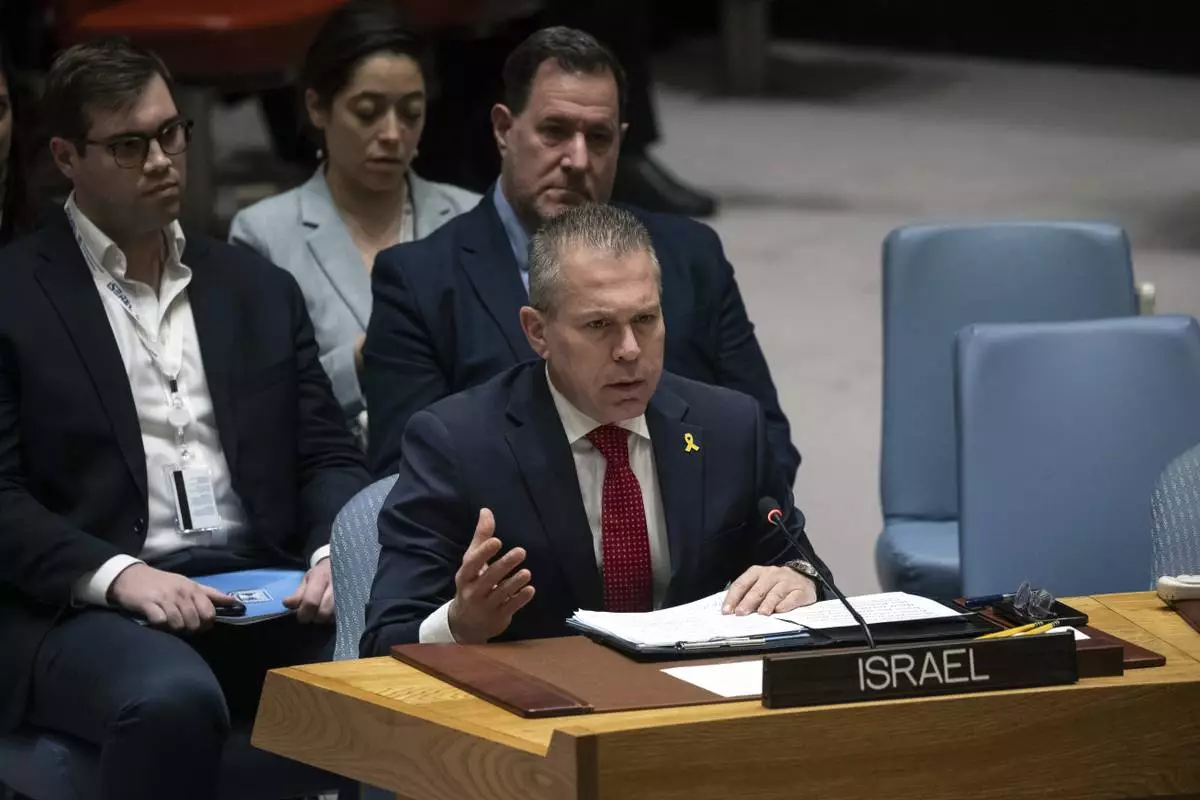
Israeli Ambassador to the United Nations Gilad Erdan speaks during a Security Council meeting at United Nations headquarters, Thursday, April 18, 2024. (AP Photo/Yuki Iwamura)
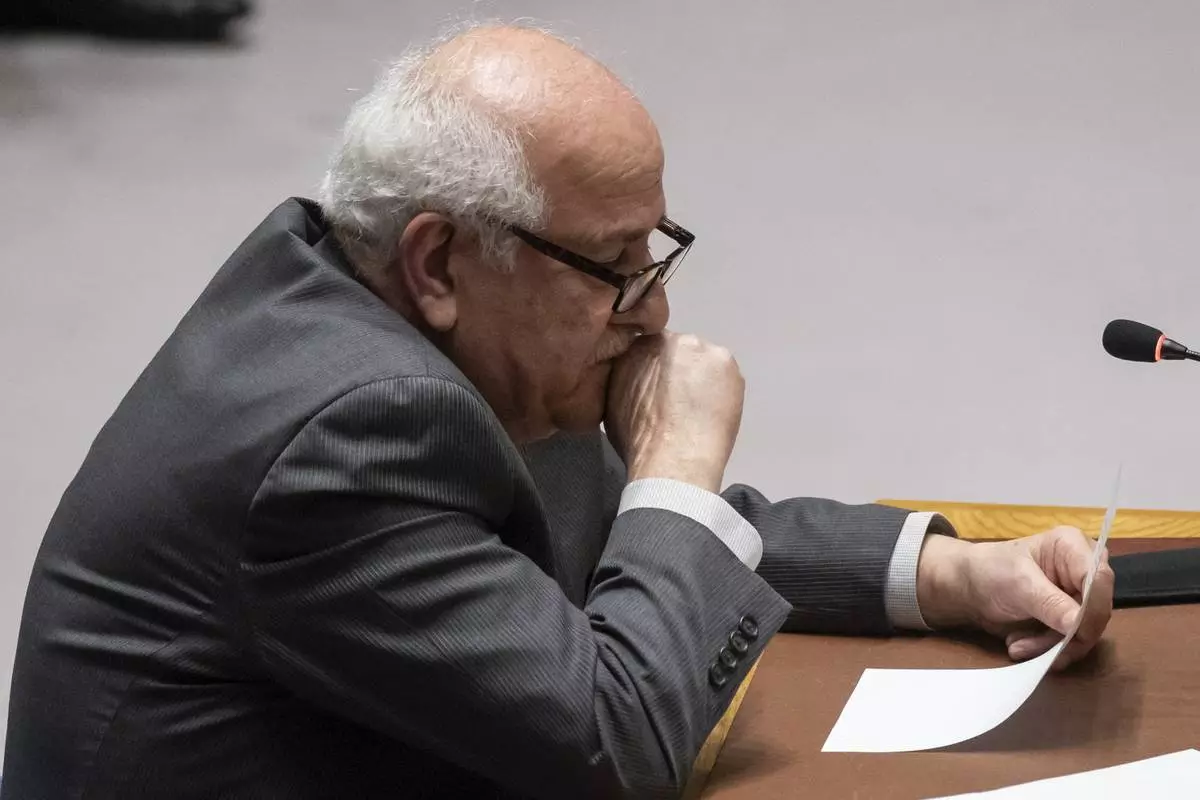
Palestinian Ambassador to the United Nations Riyad Mansour holds tears while speaking during a Security Council meeting at United Nations headquarters, Thursday, April 18, 2024. (AP Photo/Yuki Iwamura)
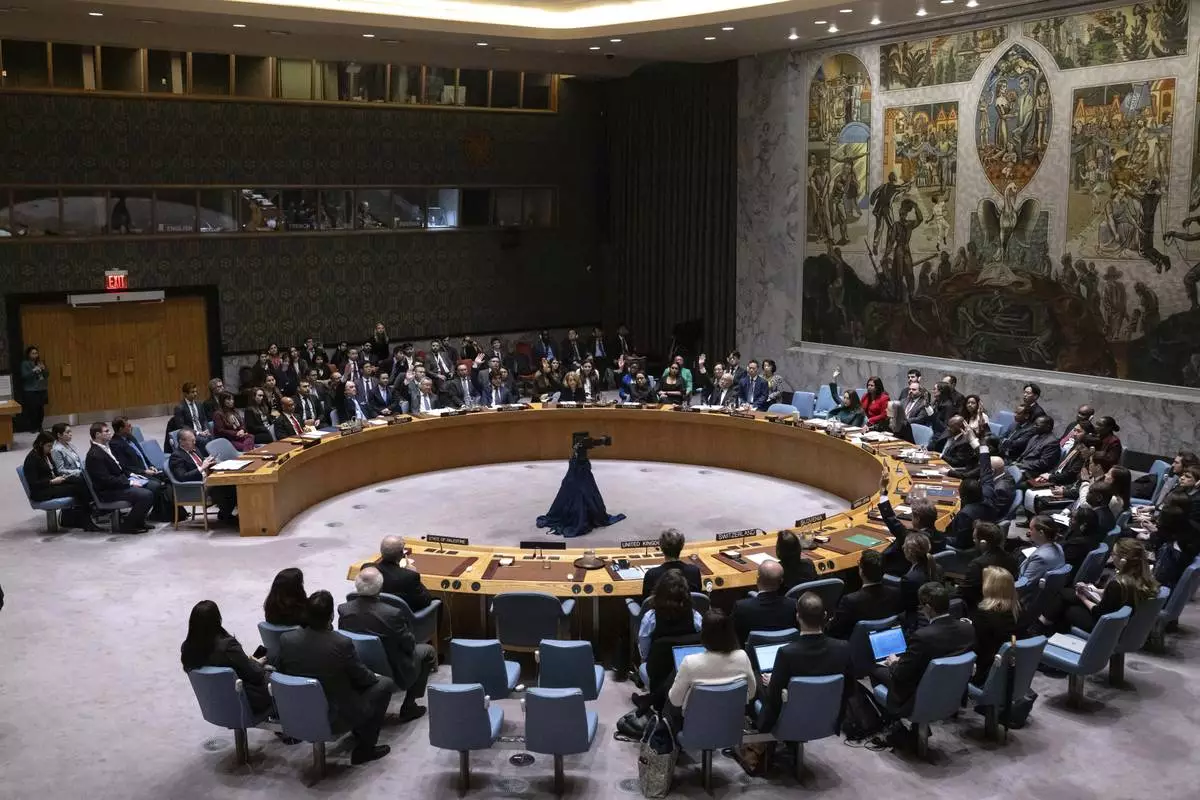
Representatives of member countries take votes during a Security Council meeting at United Nations headquarters, Thursday, April 18, 2024. (AP Photo/Yuki Iwamura)

Palestinian Ambassador to the United Nations Riyad Mansour, left, and United Nations Secretary-General Antonio Guterres speak before a Security Council meeting at the United Nations headquarters, Thursday, April 18, 2024. (AP Photo/Yuki Iwamura)
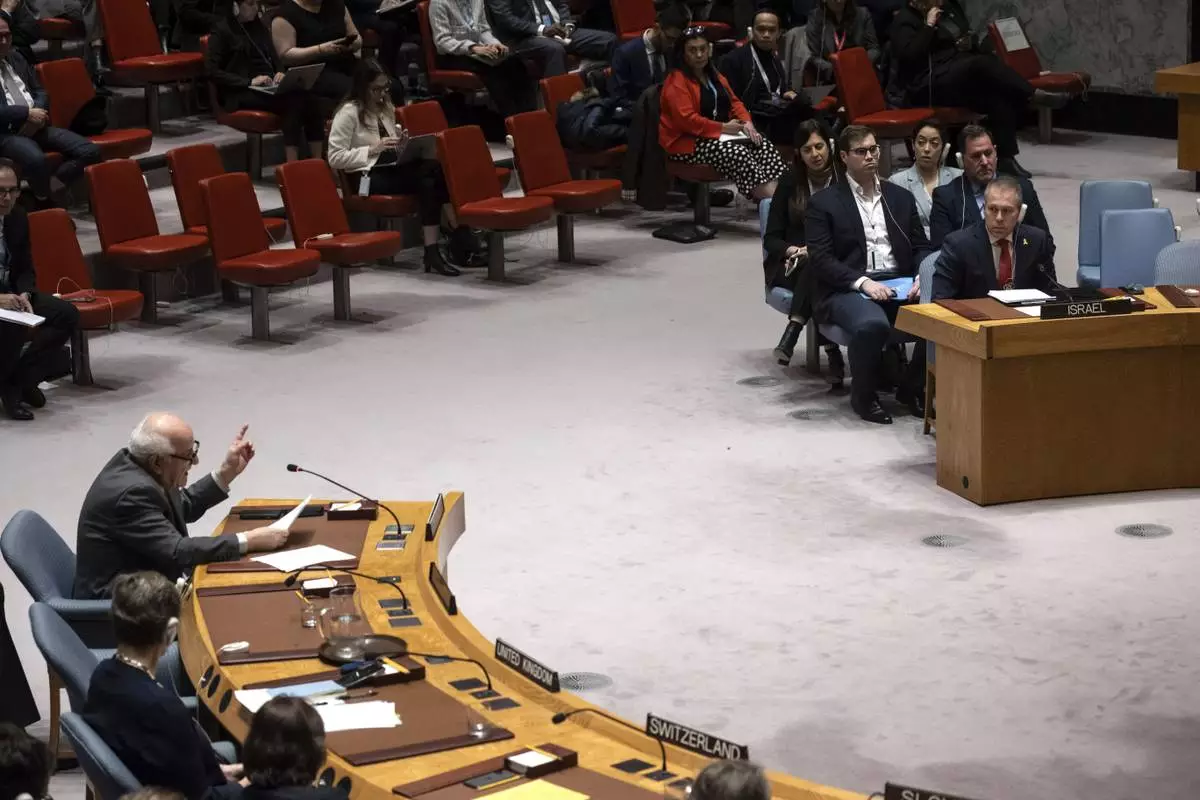
Palestinian Ambassador to the United Nations Riyad Mansour speaks during a Security Council meeting at United Nations headquarters, Thursday, April 18, 2024. (AP Photo/Yuki Iwamura)
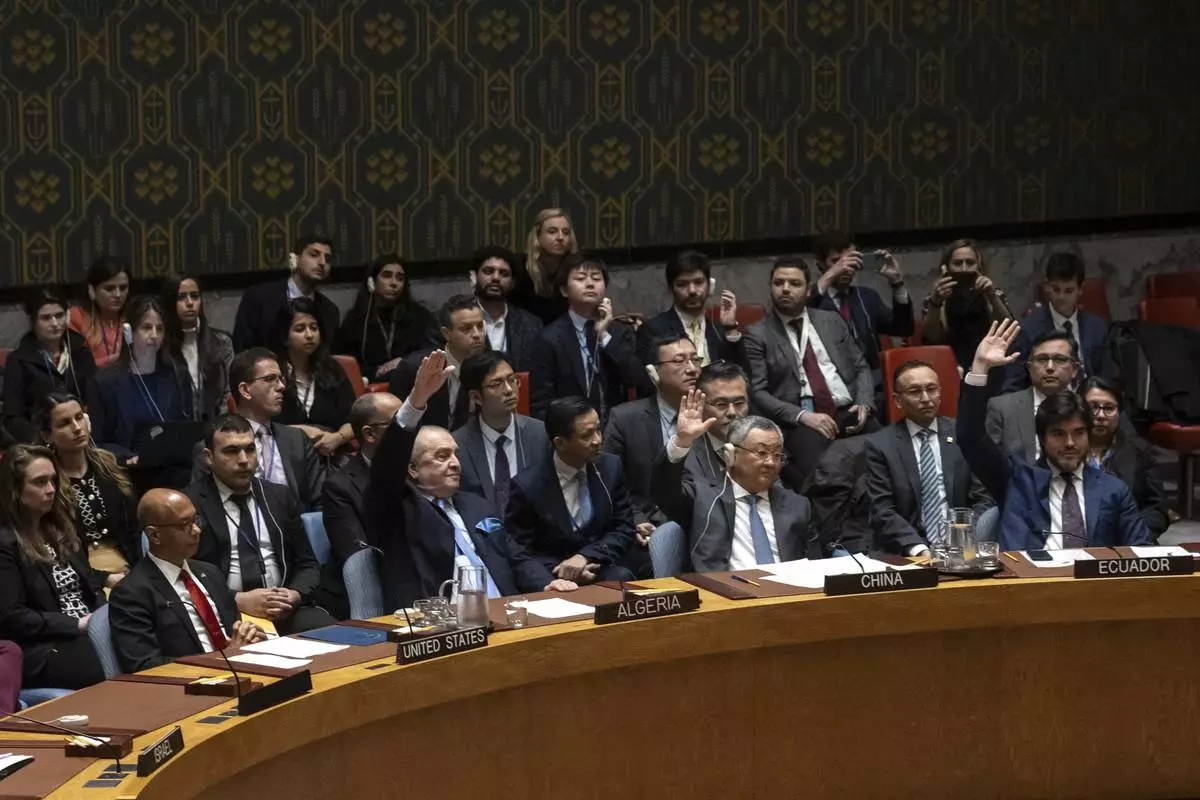
Representatives of member countries take votes during a Security Council meeting at United Nations headquarters, Thursday, April 18, 2024. (AP Photo/Yuki Iwamura)
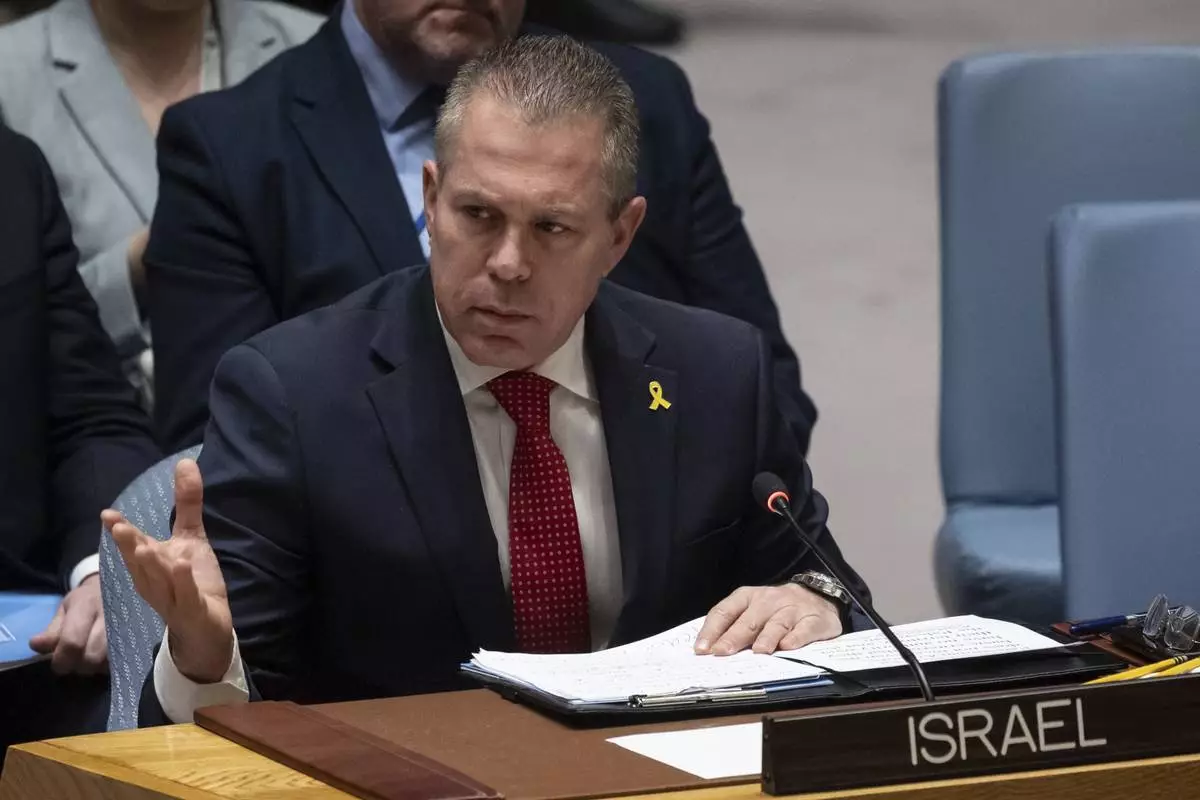
Israeli Ambassador to the United Nations Gilad Erdan speaks during a Security Council meeting at United Nations headquarters, Thursday, April 18, 2024. (AP Photo/Yuki Iwamura)
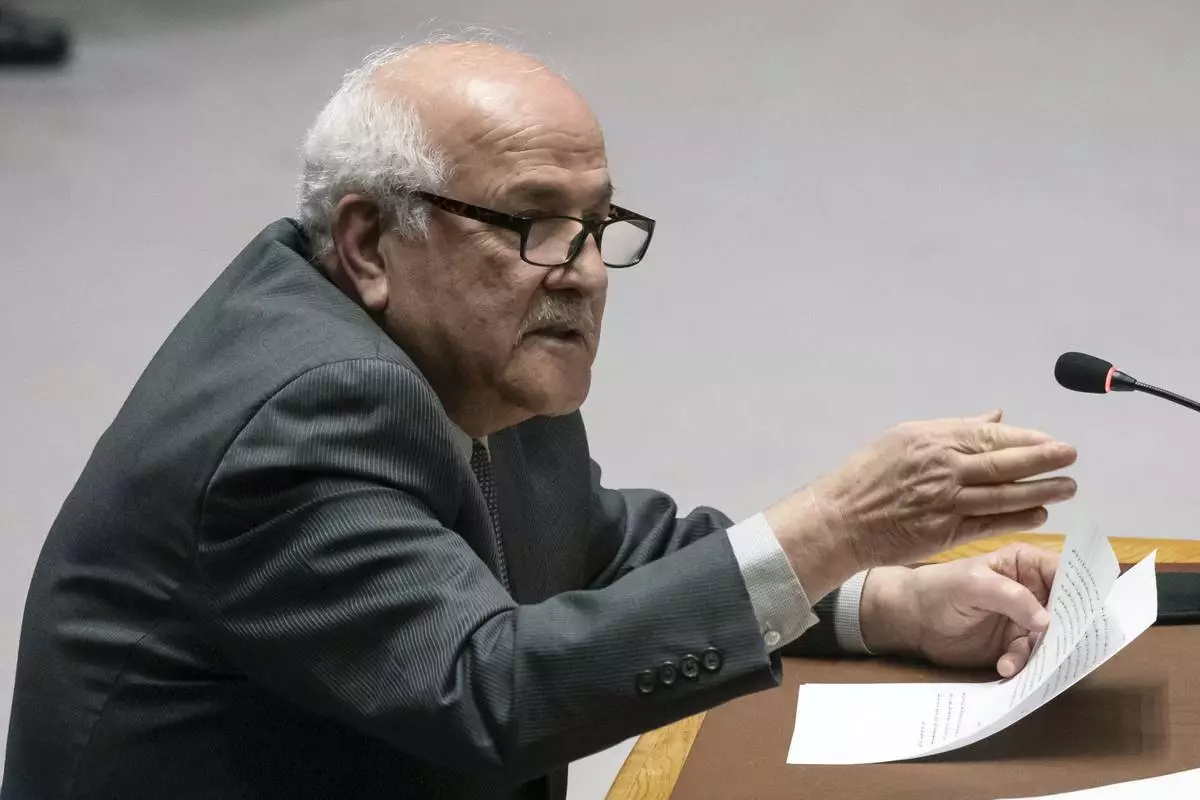
Palestinian Ambassador to the United Nations Riyad Mansour speaks during a Security Council meeting at United Nations headquarters, Thursday, April 18, 2024. (AP Photo/Yuki Iwamura)
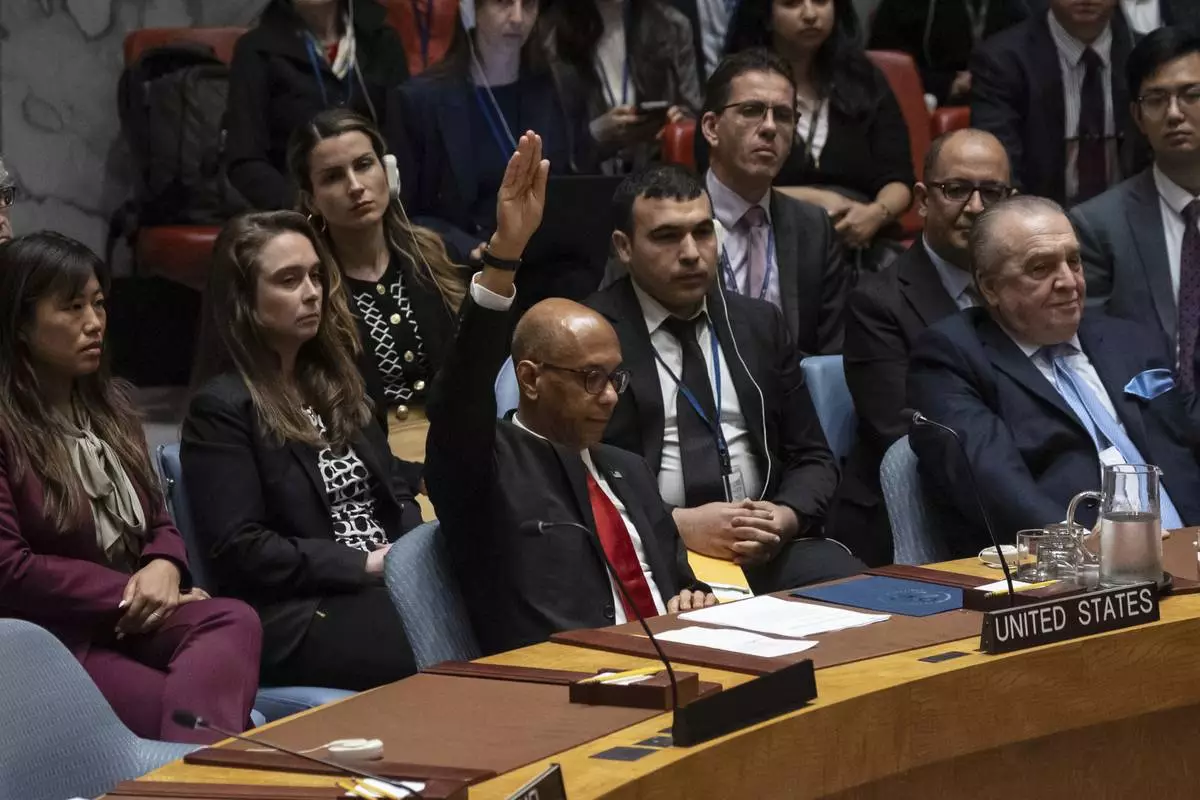
U.S. Deputy Ambassador Robert Wood votes against resolution during a Security Council meeting at United Nations headquarters, Thursday, April 18, 2024. (AP Photo/Yuki Iwamura)



















